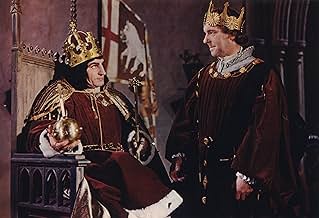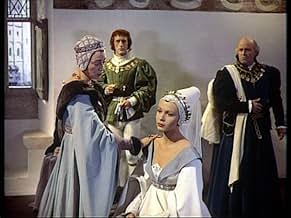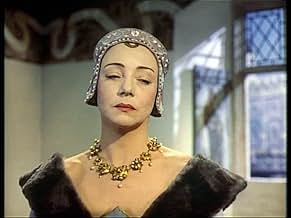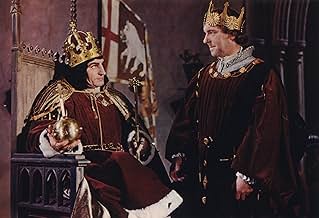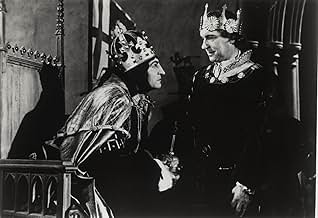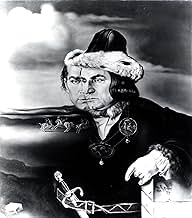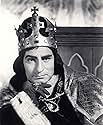Shakespeares kraftvolle Geschichte über den bösen, deformierten König und seine Eroberungen, sowohl auf dem Schlachtfeld als auch im Boudoir.Shakespeares kraftvolle Geschichte über den bösen, deformierten König und seine Eroberungen, sowohl auf dem Schlachtfeld als auch im Boudoir.Shakespeares kraftvolle Geschichte über den bösen, deformierten König und seine Eroberungen, sowohl auf dem Schlachtfeld als auch im Boudoir.
- Für 1 Oscar nominiert
- 9 Gewinne & 3 Nominierungen insgesamt
- Monk
- (as Wally Bascoe)
Empfohlene Bewertungen
Quite well. Because "Richard III," like "Patton" or "Scarface," is essentially a one-man show, and Olivier was the best Shakespearean actor of his time or since, we are in good hands. As a director (and uncredited co-writer), Olivier telescopes the action on screen in such a way as to negate the necessary stageiness of Shakespeare's text. He moves us the audience from one scene to another by pulling back a curtain and nodding to us to come closer, as if we were an old friend. He yells some lines, then coos others, his vocal dynamics challenging even seasoned readers of the play in terms of what he chooses to accent and what he does not. Finally, he finds the ample stores of humor Shakespeare gave this, one of his darker plays.
"A sweeter and a lovelier gentleman...the spacious world cannot again afford," Richard says of one man he killed, and Olivier invests moments like this with a firm tongue in cheek. While wooing that man's wife (strictly for political gain), he actually draws a sword when presenting himself as the widow's new suitor, telling her to plunge it into him if she won't be his bride. She tells him he's a liar. "Then never man was true!" Richard shouts, and Olivier as he says this rolls his eyes shamelessly, like a silent-screen matinée idol. I can't watch that scene without laughing; it's a Mel Brooks moment.
The film does move slowly, despite Olivier's trims. Entire scenes get cut out, yet the first act is drawn on for nearly an hour with the help of some dialogue brought in from another Shakespeare play. Surely Olivier could have set more up as part of the opening text narrative, and gotten down to business with that famous opening soliloquy.
A worse fault is the woodenness of some of the actors, like the ones who play Catesby, Brackenbury, and especially Lord Hastings. It doesn't help that they don't get the same chance to address the viewer that Olivier avails himself. Sir John Gielgud even seems lost playing a naive victim of Richard's complots. Seen to better advantage are Claire Bloom as the woman Richard woos, Michael Gough as a murderer, and Patrick Troughton as the nasty child-killing nobleman Tyrell.
Ralph Richardson gives the second-best performance in the play as the Duke of Buckingham, a half-step behind Richard in guile and cruelty, but trying to catch up in his own cold-blooded way. It's funny to read here that Olivier wanted Orson Welles in the role. Welles would have seemed too crafty. Richardson makes a believable victim as well as conspirator. Also, you have to mention Pamela Brown's Mistress Shore, who has no lines (because Shakespeare wrote none for her) but manages in Olivier's direction to play a central role by currying the bedside favor of King Edward and of Hastings.
But Olivier of course is the only reason this movie is still watched. And he's worth watching as long as movies are seen. Yes, he may have won World War II making his movie version of "Henry V," and his "Hamlet" was when he became Hollywood's favorite emissary of high culture, but "Richard III" is still the thing to catch the conscienceless of the king, his moment of highest dungeon and merriest perversity. It's movies like this one that remind us why acting can be a noble profession, even for those who aren't knighted for their excellence in it.
"Now is the winter of our discontent made glorious summer by this son of York" just seeing Richard's stooped, deformed figure hobble to the camera like some monstrous spider; to hear those bitter words delivered with such articulate power, and to be penetrated by that stony, constant glare is enough to know that this is no ordinary actor... this is a thespian whose legend will leave generations and generations of actors to come hopeless (teeth gritted) Whatever people say, Kenneth Brannagh will NOT be the next Laurence Olivier!!!
This movie has a fantastic cast: get this! Ralph Richardson AND John Geilgud AND Claire Bloom! Claire Bloom is especially exquisite and I think she plays the soulfully lamenting Lady Anne to perfection. Her scenes with Olivier are great; there is such agitation and irony between the two. I especially like it when he woos her by her husband's tomb... just goes to show how even in a tyrannical role Olivier can still steal a woman's heart with his irresistible seductiveness. She is beautiful and a most accomplished actress; I wonder why she is not better known... is Richard the only Shakespeare film she did????
Geilgud is wonderful as the doomed Clarence, done to death by the scheming Richard; my only disappointment was in Buckingham, played by Ralph Richardson. Richardson left me with a completely wrong impression of Buckingham, who (or so I learn from the play) is not all that different in character from Richard; but is scheming and devious also. Sad to say, (and I have read Olivier admits it so himself) Richardson was cast wrongly as the Duke of Buckingham... he acts too innocent and unsuspecting.
I must also give a technical comment on the camera angle; I would have preferred to be nearer Olivier at some parts of his scenes... that said, I must say I liked the scenes theatrical as such... why are other reviewers always moaning about the costumes and the settings? The costumes I liked, the settings I liked, the music by william walton was great (olivier had good taste in music though he was definitely not a musician himself) and really suited the swiftly changing reflective to agitated moods of the characters.
That said, I believe Laurence Olivier's Richard III to be (with perhaps the exception of his Henry V) the most worthily majestic film ever made in England. The greatest of course, would have been to see such a master of his incandescent talent on stage as Richard since Olivier was finest on stage live, but to be realistic, there is not much of his stage performances recorded, if any, and to be left this masterpiece that Shakespeare himself would have been proud to see performed, is a tribute to the most incredible actor of this century, and most probably, of all time.
The movie is beautiful, rich; the costumes are awesome; and the dialogue, of course, is wonderful. He patches in that great speech from Henry VI, part 3: "Why, I can smile, and murder whiles I smile . . .": and the movie wouldn't be right without it.
The other actors, Britain's elite of the time, seem to be tyrannized by the boss; and the text should have been edited better, because if you don't know the play and practically the whole history you'll get lost. Not to worry, though; the subplots here aren't really important (but they should be), and the thundering battle at the end will leave you satisfied. Special mention of Sir William Walton's music, the vibrant colors, and of course, England itself.
Olivier's expertise in stage technique, married with an exceptional talent, makes for shots that last for more than a minute before the cut while he delivers the goods to camera.Set mainly in a castle ,simple but true to stage, with powerful monologues from all concerned.The dialect used is easier for the novice Shakespearian to understand than it is in some other such plays.
The ultimate treacherer who can,"add colours to the camelian and set the murderous Machiavelli to school".He makes no secret to the audience of his villainous disposition.Likewise the role makes no secret of Sir Larry's brilliance. Filled with classic lines such as,"a horse ..my kingdom for a horse!" and ,"Now is the winter of our discontent made glorious summer..." . this film ,true to Shakespeare's other work has the mixture of tragedy and comedy, historic fact meets convenient fiction with a splash of romantic betrayal.. Utterly outrageous !
Wusstest du schon
- WissenswertesMichael Gough got his part (Dighton, the first murderer) by making a fuss to his fellow actor friends about only established stars getting cameo parts and leaving nothing for struggling actors like him. One night he got a phone call, and a voice said "You've been stirring it, haven't you? Right little shit." Gough demanded to know, "Who is this?" only to be stunned by the response, "It's Larry", which of course was Sir Laurence Olivier. Olivier was just having some fun at Gough's expense, had taken on-board his criticisms and was ringing to offer him the part of one of the murderers in this movie. When asked which one he wanted to play, Gough quickly said "Whichever one has the most lines", and he got his wish. Olivier arranged matters so that Gough's scenes were split over several days, instead of all being done in one day, so that Gough would maximize his per diem fee.
- PatzerIn the scene when Richard tells King Edward of Clarence's supposed treason, two monks are singing hymns from a large book: their lips are not only out of sync with their singing, but with each other.
- Zitate
Richard III: I'll drown more sailors than the mermaid shall,/ I'll play the orator as well as Nestor,/ Deceive more slyly than Ulysses could,/ And, like a Sinon, take another Troy./ I can add colours to the chameleon, /Change shapes with Proteus for advantages, /And set the murderous Machiavel to school./ Can I do this,and cannot get a crown?/Tut, were it farther off,/ I'll pluck it down.
- Crazy CreditsMost of the film's credits are shown at the end. The opening credits show only the title of the film, William Shakespeare's name, and the names of the main actors.
- Alternative VersionenReleased in Great Britain at 155 minutes; some of the prints released in the USA are 139 minutes.
- VerbindungenFeatured in Great Acting: Laurence Olivier (1966)
Top-Auswahl
Details
- Erscheinungsdatum
- Herkunftsland
- Sprachen
- Auch bekannt als
- Richard III
- Drehorte
- La Mancha, Castilla-La Mancha, Spanien(Bosworth Field scenes)
- Produktionsfirmen
- Weitere beteiligte Unternehmen bei IMDbPro anzeigen
- Laufzeit
- 2 Std. 41 Min.(161 min)
- Farbe


